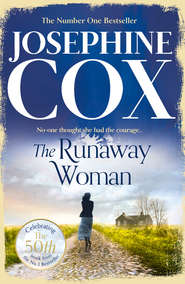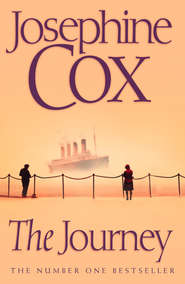По всем вопросам обращайтесь на: info@litportal.ru
(©) 2003-2024.
✖
Josephine Cox Sunday Times Bestsellers Collection
Автор
Год написания книги
2018
Настройки чтения
Размер шрифта
Высота строк
Поля
Barney was filled with emotion, that his two sons had seen such contentment in his own life that they wanted the same for themselves. ‘I’m glad,’ he answered gratefully. ‘It were allus my wish that the two of you would follow in my footsteps. But it had to be your decision, not mine.’
Just then, Lucy and Vicky arrived to join them, little Jamie toddling between them.
Barney grabbed hold of Vicky’s free hand. ‘Is there any o’ that elderberry wine left over from dinner, sweetheart?’
‘Half a bottle.’ Vicky instinctively squeezed his hand. ‘Why?’
His face beamed up at her. ‘’Cause we’ve summat to celebrate, that’s why.’ He gestured towards his sons. ‘You and me have talked long and often, wondering whether the boys might take up the farming as a way of life, and tonight, they’ve given me their answer.’
When Barney’s smile widened, Vicky gave a little squeal of excitement. ‘Oh Barney! So they want to be farmers, like their dad?’ With moist eyes and a smile hovering between tears and laughter, she ran to hug them. ‘Oh, I’m so glad!’ And now the tears came. ‘We did think you might eventually decide to go out into the big, wide world and do summat different, but oh, we did hope …’
Ronnie held onto her a moment longer. ‘If you’re gonna start crying, we might have to change our minds. Stop it, Mam, you’re scaring the little ’un.’
Laughing, she scooped Jamie up and said to Lucy, ‘We’ll go and get the kettle on, shall we, and dig out the wine again.’
‘Good idea.’ Lucy went up to the two young men and gave them each a kiss. ‘It’s wonderful news.’
Back in the big farmhouse kitchen, with everyone sitting comfortably, Barney filled the glasses and Vicky handed them round. ‘A toast!’ Barney raised his glass. ‘To a fourth generation of the Davidson farmers.’
He thought with pride of his father and grandfather, and the ones who had gone before, all contented men who had lived well into their eighties. And now, his own two sons were to carry on the tradition.
His sense of pride was mingled with regret.
He couldn’t help but wonder if he would ever see the next generation; his own grandchildren. That would be the greatest thing.
Somehow, though, his instinct told him that he was not destined to live the long life of his forefathers.
Chapter 12 (#ulink_7bffecc5-63c1-5cf3-9495-37e5e75878b9)
LEONARD MAITLAND HAD spent several days trudging the many fine streets of Boston, going from one office to another, placating irate creditors and dealing with problems he had never envisaged. There was no chance for him to explore the city this time. As he strode along today, he thought how he would have loved to watch the Red Sox baseball team play at Fenway Park, as he had so often done with his grandfather, but there was no time, no time! His whole future depended on putting things right. Having studied everything with the lawyer executing the terms of Farley Kemp’s Will, he had been kept so busy his feet had hardly touched the ground.
And now he was on his way to the lawyer’s office to tie up all the loose ends.
‘Go right in, sir.’ Smart and efficient, the young woman behind reception had the sweetest smile. ‘Mr Lovatt is expecting you.’
‘Good to see you, Lenny. Please come in.’ The big man with the horn-rimmed spectacles threw open the door of his inner office. ‘I believe we’re as ready as we’ll ever be.’
Having been a respected lawyer in New York before the Wall Street Crash last year, Mr Lovatt’s experience of matters relating to property was unsurpassed and, not surprisingly, his appointment book was invariably full.
Gesturing to the big leather armchair, he informed Leonard, ‘I don’t know about you, but I sure could use a cup of coffee. I’ll order it while you make yourself comfortable.’ With that, he pressed a button on his desk and said, ‘Clara, a pot of coffee, please. Our client may also appreciate a few of those cookies your mom made – that is, if you have any left?’ There was a pause, then, ‘That’s great!’
Returning his attention to Leonard, the lawyer took up a thick file and slid it across the desk to him. ‘It’s all there – names, addresses, the extent of debt and terms agreed.’ He grinned smugly. ‘We’ve covered a lot of ground, negotiated with the creditors, and now, with the meeting scheduled for tomorrow morning, the rest should be just a formality.’
Leonard nodded his appreciation. ‘You’ve done all the back-breaking work, and it goes without saying, I’m very grateful.’
The big man settled back in his chair. ‘As you know, I don’t come cheap,’ he said with a disarming smile. ‘It’s my job to know the enemy. Once you know what you’re up against, you can prepare for battle.’ He tapped his nose shrewdly. ‘And win.’
Leonard was nervous, but he had done his homework and was ready. ‘It’s just unfortunate that it had to be this way.’
The big man also regretted the situation. ‘Look, Lenny, with regard to your grandfather’s Will, I’m real sorry it turned out like this.’
‘It did come as a shock,’ Leonard muttered, casting his gaze to the papers in front of him. ‘I always thought that Farley was a wealthy man. He certainly always lived like one. He spoiled me rotten when my parents died, and he and Gramma Sophie came over to England to take me back with them.’ A lump came into his throat. His parents had died when he was four, in an influenza epidemic in London. ‘It shook me to the core when you told me he was in so much debt, he was on the brink of losing everything.’
When he looked up, his expression was pained. ‘Why in God’s name did he have to be so proud?’ he said thickly. ‘If only he had confided in me, I would have helped. Dear Lord, it must have troubled him so much!’
‘I pleaded with him time and again to contact you,’ the big attorney said sadly. ‘I would have contacted you myself, but he absolutely forbade it.’ He threw his arms out in a gesture of helplessness. ‘All along, he insisted he had everything under control. I wasn’t privy to all your grandfather’s interests, so of course I took him at his word.’
Just then, a tap sounded on the door and in came the young woman called Clara with a tray containing a big pot of coffee, a jug of cream and a plate of delicious-looking biscuits. She poured them each a cup, and said with a smile, ‘If there’s anything else, you will let me know, won’t you?’
The big man held out the plate. ‘Cookie?’
Leonard took one. ‘However could my grandfather have got so deep into gambling?’ he mused aloud for the hundredth time, before drinking a sip of coffee and biting into the biscuit.
‘You recall I told you about the two Irish brothers that Farley befriended?’ the lawyer asked. ‘How they came to work for him at the spread and turned up drunk one night, with a racehorse they’d won on the gambling. Your grandfather had been awful lonely these past few years, ever since he lost his wife. He found a welcome distraction at the racetrack, and he had a few lucky strikes before it all went wrong. You see, like all gamblers, he always believed the next big win was just around the corner.’ He shrugged. ‘An intelligent man like that … He wasn’t the first to get in above his head and you can bet your bottom dollar he won’t be the last. It’s a sad thing, Lenny – but it happens.’
Deep down, if he was honest with himself, Leonard had not been too surprised at what the lawyer had told him. ‘He always liked to place a bet on sporting events,’ he admitted. ‘I recall Grandmother lecturing him one time, but it was never a problem, not then anyway. And why in God’s name did the banks let him get into so much debt?’
The attorney pointed to the file on his desk. ‘As you’ve already seen, it wasn’t only the banks, though they were by far the biggest creditors. Mr Kemp borrowed money from whoever would lend it, and no one refused, because they knew him as a respected and reliable man who ran one of the biggest homesteads in this part of Massachusetts. The Depression has affected everyone here in the States, as it has in your country, and these people want their loans repaying. They need that money, Lenny.’
‘And now, if we can’t agree a settlement, everything may have to be sold.’ Leonard recalled the place where he had spent so many wonderful childhood years, and his face set grimly. ‘I swear I’ll behave honourably towards everyone who is owed money, but at the same time, I’ll fight tooth and nail to keep the land.’
The other man heard the passion in his client’s voice and saw how his fists instinctively clenched. ‘We’ve done all we can,’ he assured him. ‘Tomorrow morning will tell us if it was enough.’
Despairing but not altogether without hope, Leonard returned to his hotel in Beacon Hill. So preoccupied was he, he hardly noticed the pretty cobblestoned streets and grand old townhouses that characterised this famed quarter of Boston. Feverishly, he went through his notes yet again, then packed them away into his briefcase. He glanced at the clock and, seeing how he had hours before he could sleep, slipped his jacket on and went out to find the nearest bar.
Ordering a beer, he went to sit at a table in the corner, where he thought ahead to the imminent, all-important meeting with the creditors. How would they react to his offer? Would they accept it as the best course open to them? Or would they insist that the Kemp estate be sold and the monies split between them?
Gulping down his beer, he felt nervous and worried.
What if it all went wrong?
What if the estate went to auction and was lost forever? Certainly he could never afford to bid for it.
What if this … what if that. His mind was in a whirl.
With so much at stake, tomorrow could not come quickly enough.
The following morning, Leonard climbed out of bed, weary from lack of sleep and eager to be on his way. He showered and shaved and put on a clean shirt and an expensive silk tie that Patricia had bought for him. Looking at his image in the mirror he shook his head. ‘God Almighty, look at the state of you!’ With dark circles under his eyes and wisps of unruly hair protruding from behind his ears, he presented a sorry picture. ‘Leonard Maitland, you’re a damned mess.’
Slicking back the clumps of hair, he fastened his jacket, straightened his tie and turned away. He was ready to do battle. And with that he went smartly out of the room.
Farley Kemp had borrowed money from many sources, but the largest slice of debt was owed to a major bank. The meeting was scheduled to take place there.
The doorman whistled up a cab. Handing him a dime for his trouble, Leonard climbed in and gave directions to the bank. Settling himself into his seat with the all-important documents on his lap, he peered out at the Boston streets, seeing nothing.
On arriving at his destination, he paid the cabbie and watched him drive away. For a long, pensive moment he stood on the sidewalk looking up at the building; an imposing structure with dark-suited businessmen arriving and departing through its doors. This was the place where his future would be decided.
As he came out of the elevator, he could hear them: the shuffle and bustle of many people in one room; the scraping of chairs and the pacing of footsteps; and as he opened the door to the offices, he could almost smell their anger.











